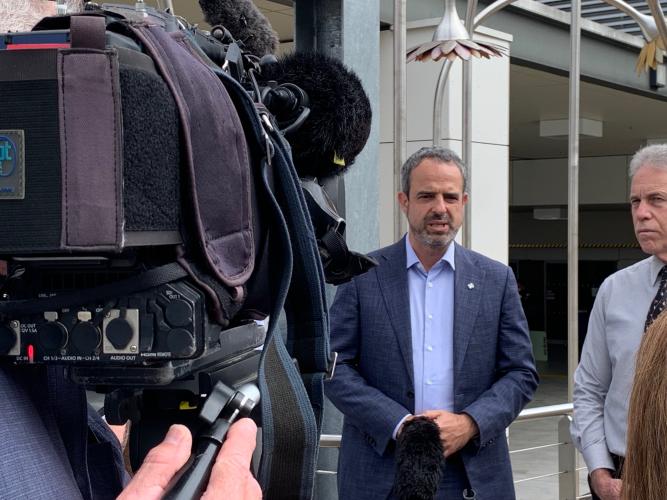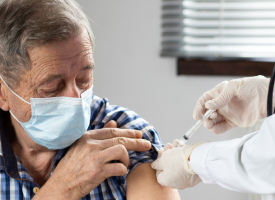Dr Omar Khorshid on 'Tasmania Talks' on Tas public hospital report card
Transcript: AMA President, Dr Omar Khorshid in Launceston on Tasmania Talks with Mike O’Loughlin
Subject: Tasmania Chapter of Public Hospital Report Card

MIKE O'LOUGHLIN: Now, we speak with the Tasmanian branch of the Australian Medical Association, otherwise known as AMA Tasmania, quite regularly on Tasmania Talks. But national AMA President, Dr Omar Khorshid is in Tassie today releasing our state's latest public hospital report. Yeah, the report card's not flash. Let's find out how we went. Dr Khorshid joins me live in the line now doctor, good morning. I do thank you for your time and welcome back to Tassie.
OMAR KHORSHID: Thank you very much, Mike. I'm really pleased to be here, although the job today is not such a pleasant one, just to point out what's going on in Tasmania in hospitals.
MIKE O'LOUGHLIN: Look, I'm glad I'm going to let you go through it; it's absolutely disgraceful. I think most Tasmanians who have had anything to do with our hospital system in recent times, we love the people there, we love the hard work they do, but they'd be aware that things aren't really where they need to be. Just how bad have we scored in the AMA's public hospital report card?
OMAR KHORSHID: Well, unfortunately, Tasmania continues to languish at the bottom of the list of states in terms of the performance of the public hospital system under a range of measures. And to give you some numbers, only 36 per cent of people waiting for category 2 elective surgeries - that's reasonably urgent, essential surgery that should be done within 90 days - only a third of those are actually getting done within that 90 days, which is the worst of any state. But it's actually even more worrying when you look at emergency presentations. So, around half of Tasmanians presenting to an emergency department with a severe problem of, you know, severe abdominal pain or a major fracture, only around half of those are seen within the recommended 30 minutes, which, again, is near the bottom of the performance of the states.
And even more worryingly, if you turn up to the Royal Hobart Hospital with a critically urgent problem, a category 2 problem that should be seen within 10 minutes, less than half are actually being seen within the recommended time. And that is measured in worse outcomes for Tasmanians' health.
MIKE O'LOUGHLIN: It is quite frightening when I went through the stats as well, these- the key areas that are under performing. And especially when you look at the emergency departments, triage, et cetera. And as you've touched on, I mean, how does this- I mean, talk about the wait time, how does it compare to other states?
OMAR KHORSHID: Well, the worst wait times are, of course, in category 3 surgery, and that's things like hip and knee replacements or cataract surgery. And unfortunately, the wait times there, like in some of our other states, are well over a year. You can wait with a significantly painful problem that is affecting your quality-of-life, affecting your ability to work, affecting your mental health, your social relationships, your family relationships. That problem can be with you from the time you were booked for surgery for over- well over a year. In fact, almost towards two years in Tasmania before you get your surgery and that's simply not good enough. And what we're really here to talk about is how we fix this problem right around the country.
MIKE O'LOUGHLIN: We're doing- well, we'll certainly be getting onto that. I mean, but what if the wait- if your condition requires hospital admission, doctor, what's the wait there? Are you- apparently, it's quite considerable just to actually get a - get a bed?
OMAR KHORSHID: So, the problem with our hospitals is that they're actually jammed up from front door to back door. And there's different ways into a hospital. You could come in an ambulance, in which case we kind of measure that through ambulance ramping …
MIKE O'LOUGHLIN: [Talks over] Yeah, it is.
OMAR KHORSHID: … which I understand is a significant problem to major hospitals here. You have to wait for admission from the emergency department onto the ward because the wards are all full. And of course, if you're a patient waiting at home for elective surgery, you're waiting, as I said, very long periods of over a year. Now, some of those problems are because the hospitals themselves are simply not big enough, they haven't grown to meet the growing health needs of the community. And this is a problem right around the country where we've seen the number of beds per head of population declining to now 28 years in a row. That's when we compare the number of people over the age of 65, who are, of course, the people who need hospitals most off most often. 28 years in a row of decline.
MIKE O'LOUGHLIN: That's incredible.
OMAR KHORSHID: It's no wonder that were in this position.
MIKE O'LOUGHLIN: And I know that will soon be touching on what the AMA is suggesting, that's a major part of this conversation. But the elective surgery wait list, it's got- it is obviously one of the worst in the country. And as you said, continues to get worse with- what is it? Close to 60,000 patients waiting to see a specialist in the public health system. Incredible.
OMAR KHORSHID: Yeah. So, this is what we call a hidden waiting list. So, it's not a number we've measured in our report card, but it's on top of that more than a year wait for elective surgery. And right around the country, people are waiting too long to see a specialist in the public hospital system. But again, with 60,000 people waiting for an appointment, that's a pretty bad number for Tasmanians. And the sad reality is that once you've waited maybe over 400 days, I think it is for a child needing to see an ENT specialist for grommets, or something like that, by the time you've seen them, you've then got to go onto that surgical waiting list to wait another year or more for the actual care to occur.
MIKE O'LOUGHLIN: And when the cost of living’s rising, which is just staggering at the moment as we speak, most Tasmanians don't have the option to go with the private health system instead.
OMAR KHORSHID: That's right. That's why we need a strong and healthy public hospital system that delivers for people who can't afford our other system. And to be honest, we're pretty lucky in Australia in having those two systems, both of which are quite large, because they keep each other healthy. Because a number of Australians, and, you know, a bit under half, around 40 odd per cent of Australians, are able to afford private health insurance. That keeps them out of our public hospital system. So, we do need to make sure our private health insurance product remains affordable for as many Australians as possible.
But for those who either choose not to or can't afford a private product, we must have a public hospital system and a system of primary care out in the community that actually keeps people healthy because we know that healthy people actually are able to work, contribute to the economy and, of course, are living higher quality lives.
MIKE O'LOUGHLIN: And coming up, we'll have a chat about the hospital logjam campaign. I'm speaking with Dr Omar Khorshid, President of the Australian Medical Association. Is there one hospital, Doctor, coming out worse than the others in Tasmania, or all these issues pretty much across the board?
OMAR KHORSHID: The issues are across the board, and unfortunately they're not just in Tasmania, they're actually right across the country, that's why we think a national response is needed. We're aware that there has been some development at Royal Hobart Hospital, but the plan for the further development of that site is a 30 year plan. And AMA Tasmania tells me that it should be a five-year plan because you can't wait 30 years to add that extra capacity to Royal Hobart.
MIKE O'LOUGHLIN: Absolutely.
OMAR KHORSHID: And similarly with the LGH, there's again a long term plan that needs to turn into a short term plan to build the capacity of that hospital, to build the staff that are there so that you haven't got ambulances parked outside the hospital instead of delivering the sickest Tasmanians at our hospital so they can get their care as promptly as possible and to the highest level that we can deliver.
MIKE O'LOUGHLIN: I certainly think all the things you've outlined here, Doctor, proves we're experiencing a pretty significant health crisis. So let me ask you, do you think now is the right time for us to have ditched masks?
OMAR KHORSHID: Well, masks are- they're a bit of an emblematic sign, I guess, of the COVID pandemic. And we can see that some governments are keen to ditch them because it's a bit of a signal to the community that the pandemic is over and we're moving on with our lives. And I think we all want to move on with our lives, and I get why ditching masks is important. But on the flip side, we know that masks work. They slow transmission, and the better quality mask you wear, the lower your chance of contracting COVID. And the more people wear those masks, the less spread we'll see through the community. Now we can live with COVID and we could possibly live without masks, but when you've got a hospital system that can barely cope with one or two extra patients, if you see a big spike in cases of COVID, even though it's mild for most people, even though the vast majority of Tasmanians won't need to go to hospital, some will. Some, in particular elderly Tasmanians that are living with chronic diseases will need to go to hospital, and even if COVID isn't terribly severe in them, it just tips them over the edge, lands them in the hospital emergency department, lands them on the ward, and that just has this domino effect at blocking access to hospital for other Tasmanians who need to come in and the system grinds to a halt. That's why managing the pandemic is still important and masks are something that all state governments should be using to help balance the system, I guess, to reduce the demand on emergency departments so that everybody gets the care that they need when they need.
MIKE O'LOUGHLIN: Yeah. We had Premier Peter Gutwein on the show on Tuesday and we asked him the same question. His response was whilst cases are increasing and bouncing around a lot at the moment, the impacts on our health system and the impacts on individuals needing to enter our health system are very, very low. He said we've got the lowest number of hospitalisations across the country, so we're not seeing the increase in cases translated to hospitalisations or serious illness. And since we spoke with the Premier of course on Tuesday, we've seen cases increase from around 1000 per day to 1376 Tuesday, up to 1859 cases yesterday, which is the second highest daily number ever recorded in Tassie. And not only that, we've seen another Tasmanian die from the virus, which is absolutely tragic for them and their family and brings our death toll to 27 lives lost to COVID. So we're just going to see these cases rise now with these masks no longer mandatory? Do you honestly think or do you think the AMA should push for change?
OMAR KHORSHID: Well, the AMA is a member organisation, and I can tell you, doctors have pretty mixed views on this stuff as well. Many doctors feel that we have to live with this virus. We can't pretend that there's any way out of the situation that we're in and we've got to learn to manage it. And to be honest, I think mask wearing is something that we should be considering a little bit like many Asian countries have been doing since SARS for over a decade, might even be a couple of decades, where anybody who's got the slightest sniffle or slightest symptoms, wears a mask out and about in the community. They might still go to work, but they wear a mask because it's the right thing to do, so that when you get on the train or the bus, that you don't infect everybody on there with your virus. So I think we do have this challenge of where do masks fit in our long term management of respiratory diseases, because it's not just COVID. We're going to face the flu season this winter, probably [indistinct] ...
MIKE O'LOUGHLIN: [Interrupts] And the new sub-variant
OMAR KHORSHID: ... borders open- and of course the new sub-variant as well, which does tend to be more transmissible and is already resulting in the majority of cases in New South Wales. So, we do have to look at where masks fit in, but we also have to, I guess, pivot to a long term management plan rather than a crisis management plan. And that's really what we've been doing through the pandemic. We've been dealing with crisis after crisis. We've got to pivot, okay, what are our long term settings. What are the changes needed in our health system to help us manage any extra burden of disease from COVID? And of course, we've also got to be vigilant for new variants that might not be as mild as Omicron, but might in fact start to cause serious respiratory disease again, which Omicron doesn't seem to do, because of course that will totally change what's going on in Australia.
MIKE O'LOUGHLIN: So let's go back to the big picture now. What is the solution? We've got a federal election coming up in around two months' time. What would you like to see pledged by federal candidates? This hospital logjam campaign, please.
OMAR KHORSHID: So our hospital logjam campaign, or Clear the Hospital Logjam, is pointing out to Australians that our system is literally jammed up. Your ambulance is ramped outside the front because it can't get its patients into the emergency department. The emergency department is jammed up because it can't get its patients onto the ward, the wards are full. The wards are full because there's not enough beds, but also because the back door of the hospital is also jammed up.
The hospitals can't get people out into aged care or into the disability system quickly enough, meaning that some patients can stay in hospital for hundreds of days just waiting for the appropriate care to be set up in the community. And then, of course, we've got the fact that our primary care system isn't doing as well as it could in terms of keeping people healthy. So we've got to address those issues at their root causes.
And for us, one of the key things that we can do right now is increase the capacity of the actual hospitals. So that means beds, doctors, nurses, allied health professionals, and that means money. Now, this is a problem in every state and territory, and every state and territory is declining in terms of its hospital performance. Every state and territory is seeing hospital ramping, which was just not a thing not that long ago, and yet it's rising all around the country, and not just due to COVID. We saw this in particular after that first wave of COVID in 2020 that around the whole country, health care needs just jumped.
Now, we're going to see that following this Omicron outbreak as well. So, we've asked for the Commonwealth to increase its funding, right across the country to public hospitals. It currently pays for less than half, around 45 per cent of the cost of running public hospitals. And the Commonwealth's happy with that, because it means they're not responsible for the performance of public hospitals. It's a state issue. There's- we've got this blame game going on.
Now we'd like to see that lifted to 50-50. And we got a, I guess, a template for that, because that's what's happened during COVID - the states and Federal Government have gone in 50-50 on the health costs of COVID, so, let's apply that to our whole public hospital system. Let's remove the cap that the Commonwealth puts on growth, and that's a total cost around $20 billion over four years - a lot of money. But that's money that is needed to be reinvest it into the public hospital system, to create that space so that the hospitals aren't jammed up all the time, and we can get care back to where it should be.
Now, for that to work, we also need the state governments to promise not to pocket the extra money, and that's one of the Commonwealth concerns, but of course [indistinct]…
MIKE O'LOUGHLIN: [Talks over] A major concern, doctor, isn't- I mean, that's a major concern, really, isn't it? That's the thing. They pocket so much of it from petrol excise, et cetera. This is- that is probably my concern. I think the 50-50 funding agreement is a great suggestion. The 20.5 billion is a very- is a sensible number and a realistic number.
OMAR KHORSHID: It certainly is. And it's the kind of number that is needed to make a measurable difference. Governments are keen to plant this program here, or open that small hospital there, but, we actually need to change the fundamentals of the system. And we think an investment like this in public hospitals will make a difference.
We've actually asked. I've written to each state health minister, asking them to commit to not pulling back any of their funding if the Federal Government does increase is proportion to 50 per cent. I was in South Australia yesterday and got commitments from the South Australian Government and the Opposition going into their election on the weekend, that they would maintain their funding and not pull back a single cent out of healthcare if the Commonwealth stumps up more. And we'd like to see that commitment from the Tasmanian Government, as well as, of course, some commitments from the candidates up here in the north of Tasmania - Bass and Braddon, these famous marginal seats…
MIKE O'LOUGHLIN: Good call.
OMAR KHORSHID: …to hear, what are their views? Because marginal seats are going to matter in this election. And we're not getting enough traction so far with either the Government or the Opposition on public hospital funding. So, we'd like to get these candidates for these marginal states to make their views very clear on, do they support fixing our public hospital systems once and for all? Or not?
MIKE O'LOUGHLIN: Well, you've got Liberal MP, Bridget Archer, challenge the Labor candidate, Ross Hart; Liberal MP for Braddon, Gavin Pearce, challenger Chris Lynch. And also, I'll follow up with Jeremy Rockliff in the state. But I was also interested, if I could get an opinion from you, we spoke with AMA Tasmania President, Dr Helen McArdle, a little while back about calls for a single, modern hospital on the northwest coast. Is this part of what you're asking to be pledged, perhaps?
OMAR KHORSHID: So what we're asking for is, I guess, a reform to the, what they call, the hospital reform agreements. It's really a funding instrument that describes the relationship between state and Federal Government's, and how much money flows. So that's not going to be specific about hospitals. But, what we do want is for this extra 5 per cent of hospital funding to be available to state governments to reinvest in their health system. And that will enable investments such as a modern single hospital for the northwest, which actually delivers modern healthcare to people living in the northwest - rather than the kind of traditional, smaller, regional community hospitals. And without money, those commitments are very hard for state governments to make. But we think this will enable the Tasmania Government to take that step, should it choose to do so.
MIKE O'LOUGHLIN: Well, the State Government's finally released its long-awaited roadmap for the Launceston General Hospital redevelopment. Have you seen that? And if so, what are your thoughts there? I mean, everything seems to be years and years away, and you look at the urgency, as we've spoken with today. It's incredible.
OMAR KHORSHID: I understand that the hospital ramping at the LGH is actually worse than Royal Hobart, despite Royal Hobart getting most of the headlines. So look, I've not seen that plan in detail. But what I hear from AMA Tasmania is that they share your concerns, that these plans are way too long into the future. And we know that governments are really only looking a couple of years into the future - they're not going to seriously commit to long, long-term commitments. And of course, they're not going to make any difference to the health of Tasmanians unless they're delivered now and in the immediate future.
So, we would certainly call for those plans to be fast-tracked. And I hope that if we are able to achieve 50-50 funding with the Commonwealth, that that extra money can be reinvested in exactly these sorts of ways.
MIKE O'LOUGHLIN: It'll be interesting, I guess. Your thoughts quickly on Greg Hunt, of course, leaving after the election. Any hopes for a replacement? Would you have any thoughts there? Because that's what's happening with this election coming up.
OMAR KHORSHID: Yeah, the Federal election on health is interesting with a departing or retiring minister. We, of course, don't know who the minister would be if the Liberal Party are re-elected. And of course, we have in Labor, Shadow Minister Mark Butler - someone who has been in health before and has a reasonable understanding of health. So, he's a relative known quantity. We don't know who will take over from Greg Hunt if the Liberals win.
I guess what we want is for them both to be honest with the community about their plan for healthcare, for primary care, for hospital funding. Rather than hoping health goes away or is, I guess, drowned out by the war in Ukraine and cost of living concerns that are of course very real and very important.
But, you know, we're seeing in South Australia that, actually, hospitals and health will turn an election. We need Labor to have the courage to actually say what they stand for and not play this small target strategy. And we need the Government to demonstrate that it is actually committed to reform, both in primary care and in hospitals.
MIKE O'LOUGHLIN: And if I can finish with a question from one of our listeners? Kevin from Devonport has called up, Doctor, with a question. He says he used to work in a hospital. Every year, they closed beds down in order to make room for offices. How can we be sure the beds we do get from this funding won't just be shut down in the future? Interesting question.
OMAR KHORSHID: It is an interesting question. And it's about holding the operators of the hospitals to account for their performance. And, you know, the Federal Government just doesn't hand over money to the states - there are some strings attached, and we think there should be strings attached. One of the parts of our public hospital plan is for there to be a new way to measure the output from hospitals - not just in the number of widgets of activity or in the dollars spent, but actually outcomes, health outcomes that actually matter. And if we are measuring health outcomes, then we'll be able to measure whether hospitals are delivering, and whether state governments are delivering on their commitments.
MIKE O'LOUGHLIN: I just wanted to wish you all the very best. I think it's a tremendous project - the AMA's clear the hospital logjam campaign. Costed, as I said, $20.5 billion over four years, as you've said. I hope it gets a tremendous support from whatever party gets in. Dr Omar Khorshid, President of the Australian Medical Association, I'm very grateful for your time this morning. Enjoy your stay in Tassie as much as you can.
OMAR KHORSHID: Thank you very much. It's been a pleasure, Mike. And yeah, I'm looking forward to talking to the candidates this afternoon to hear their views and what they're willing to say.
MIKE O'LOUGHLIN: Good call. Thank you so much for your time this morning. I do appreciate it. Dr Omar Khorshid. (Ends)



